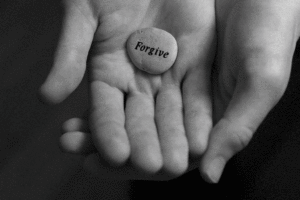For 40 years, Prison Fellowship® has been going into correctional facilities, sharing the good news of Jesus Christ with those behind bars, and offering the hope of true transformation. Through the use of Bible-based programing, and with the help of thousands of committed volunteers, lives are being changed, hope is being restored, and darkness is being replaced with the promise of a future.
As 2016 draws to a close, we look back on the stories that meant the most to you and to us. Thank you for serving with us as we "remember those in prison."
The following article was originally posted August 4, 2016.
A DAY OF RESPONSIBILITY AND FORGIVENESS
by Cindy Sanford
He sat in the front row, a light skinned black man with long, slender braids streaked with gray. There was a gentle, compassionate energy about him that touched me. I was participating in a Day of Responsibility event in a Pennsylvania state prison. One hundred and twenty prisoners had signed up for the program, which is designed to help them accept responsibility for their crimes and consider the cost to their victims and communities. I'd been invited as a member of the Pennsylvania Prison Society.
 As I glanced around the room at the men in attendance, I couldn't help wondering how eager I'd be to attend a conference where all my sins and mistakes were publicly discussed. Would I volunteer for something like this? I wasn't so sure.
As I glanced around the room at the men in attendance, I couldn't help wondering how eager I'd be to attend a conference where all my sins and mistakes were publicly discussed. Would I volunteer for something like this? I wasn't so sure.
But these prisoners did. Every one of them. In fact, they worked for months to get the program approved and acquire all the outside guests, including a representative from the district attorney's office. I stole a glance at the man, marveling, in a way, that they'd invited him. He certainly wouldn't be mincing words about the effects of crime on innocent people. Not that he should. But I couldn't help wondering what kind of inmates would volunteer to be reminded all day long about their crimes.
It was finally the braided man's turn to speak and he walked quietly to the podium. The room was silent, all heads turned toward the speakers. That was the other thing I marveled over. Not one person talked out of turn. My congregation at church is never this quiet.
"I made a decision after my crime," the braided man said. "Never again would I celebrate my birthday or any holiday. I can't. It wouldn't be right. Because somewhere out there a family is seated at a table where there is an empty chair—because of me. Because of what I did when I was seventeen years old." His voice quavered with emotion. "How can I celebrate the day I was born after what I did to them?"
The obvious anguish in his voice startled me, and tears sprung into my eyes. I was never "wired" to think of a prisoner experiencing any pain and remorse over their crimes. It's not the narrative we in society ever hear. The closest most come to seeing an offender after incarceration is on some program like Lock Up, which usually attracts ratings by picking the worst behaved prisoners in the system.
I did some quick mental math. The braided man appeared to be in his late fifties, which meant he'd been carrying this burden around for about forty years. He continued to speak about the awful loss he had inflicted on innocent people in a moment of abject, impulsive stupidity. That was part of the purpose of this event, to accept the harm they had caused others. As he spoke, I thought of the family who'd lost a loved one because of a stupid, thoughtless act by a seventeen-year-old "punk." I wondered how they'd feel if they were aware of his deep remorse.
But something else became immediately clear. This gentle, grieving man was not a thoughtless punk anymore. The remorse he felt, and the tears he fought unsuccessfully when we spoke together later were not contrived. "I will never forgive myself," he told me. He looked fragile, broken, not at all like the monster I would have imagined. And seeing him standing in tears, still broken forty years after the crime, did something to my heart I never thought possible: I felt compassion for a convicted murderer.
With a sudden deep assurance in my soul, I spoke to him about forgiveness and repentance, and the words spilled out with a conviction that could not possibly have come from me. Later, when I wrapped him in a hug, the spirit of the Lord filled me with the love Christ has for this man—a convicted murderer, yes—but still a precious child of God.
It was a moment I will never forget. The Lord did not just speak to him through me that day. He spoke to me as well. What started out as a Day of Responsibility, God turned into a Day of Forgiveness, and a declaration of just how deeply He loves us all.
Cindy Sanford is the author of Letters to a Lifer: The Boy 'Never to be Released.' For more information, visit her website.
Prison Fellowship offers many in-prison programs for those incarcerated. To support Prison Fellowship, donate or volunteer today!